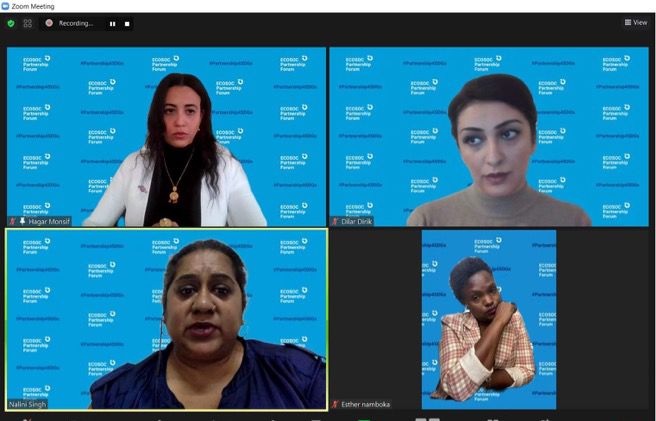Women's organizations around the world on the sidelines of the Partnership Forum: COVID-19 has widened the gender-based gaps
"Mosif": Solidarity and partnerships are the way to promote women's rights and achieve gender equality
“Singh”: The human rights situation of women in the Pacific and developing islands is the worst ever
“Dirik”: Women's organizations should launch a realistic agenda for women in conflict areas in the Middle East
Namboka: We recommend African governments to harmonize their laws with the African Charter on Human and Peoples' Rights
“Böker”: We call for providing a breeding ground for women's participation in economic strategies and decision-making centers
Number of women's organizations around the world emphasized that "Covid-19 has widened the gender gap across the world." This fact was highlighted in the event organized by Maat for Peace, Development and Human Rights, on the sidelines of the ECOSOC Partnership Forum, under the title "Covid-19 and Sexual Violence: More Challenges Requiring Solidarity".
The event was organized in cooperation with a number of women's organizations across the world; topped by the Gals International Forum from Uganda, the Kurdish Women's Movement, the International Alliance of Women (IAW), the Women's Major Group (WMG) at the United Nations, and NGO Major Group-Africa.
Hagar Monsif, Vice Chairman for SDGs at Maat Foundation, highlighted the repercussions of the global health pandemic on the conditions of women and girls, which are getting worse day by day. She stated that the multiplying challenges caused by the Covid-19 pandemic has negatively impacted gender equality. During her speech, the human rights expert stressed the importance of solidarity and partnership, and the need to work on exchanging partnerships with many experts from different regions across the world, in order to promote gender equality and protect the rights of women and girls.
Speaking of the situation of women in the Pacific Islands region, Nalini Singh, Pacific and SIDS Organizing Partner at the Women Major Group, says that this region faces unique challenges due to its geographical distance and poor economies. Women also suffer from the effects of economic problems and environmental disasters, as well as the effects of climate change. In addition to these challenges, women have struggled during the COVID-19 pandemic and the resulting shutdown in 2021. Singh recommended Pacific Island governments to collaborate with grassroots NGOs, human rights and women's rights organizations and local groups in developing long-term economic recovery plans to eliminate forms of gender inequality.
Regarding the situation of women and girls in areas of armed conflict, especially in the Middle East, Dilar Dirik, a researcher at the Refugee Studies Centre (RSC) at Oxford University, discussed the negative impact of the conflict on women's access to education and their enrollment in schools. Conflicts are among the root causes behind domestic violence against women, and the high rates of early marriage, especially in Iraqi Kurdistan, Syria and Afghanistan. Derek called on NGOs and stakeholders to cooperate and take collective action, as well as to launch their own complementary advocacy agenda that should be more realistic.
Turning to the situation of African women and girls, Esther Namboka, the Founder and Executive Director at Gals Forum International, presented a set of challenges and harmful practices that women in African countries face such as female genital mutilation (FGM), as well as child and forced marriage, among other abuses. Namboka recommended African governments to reconsider laws and policies related to women and girls, and amend them to be consistent with the African Charter on Human and Peoples' Rights, which prohibits all forms of violence against women and includes the provisions of the African Charter on the Rights and Welfare of the Child.
On a related note, Marion Böker, Acting President at International Alliance of Women (IAW), spoke about the status of women globally, especially in relation to decision-making positions. Her speech focused on the role of women in the economic sector and its importance, and the need to involve women in developing economic strategies in countries, including those related to poverty eradication. She recommended the need to expand the scope for women's participation in public life, especially in decision-making positions, and also called for more cooperation between women's NGOs, as well as the need to adhere to the provisions of the 2030 Agenda for Sustainable Development and to work on adapting countries’ systems to be in line with SDG 5 on gender equality.
It is worth noting that this meeting comes within the framework of Maat’s participation in the ECOSOC Partnership Forum, and in line with the theme for the HLPF 2022, which is “Building back better from the coronavirus disease (COVID-19) while advancing the full implementation of the 2030 Agenda for sustainable development.” The United Nations Economic and Social Affairs will publish the recommendations of this event on its website, in order to activate the partnership targeted by the forum.
shortlink: https://maatpeace.org/en/?p=34501












